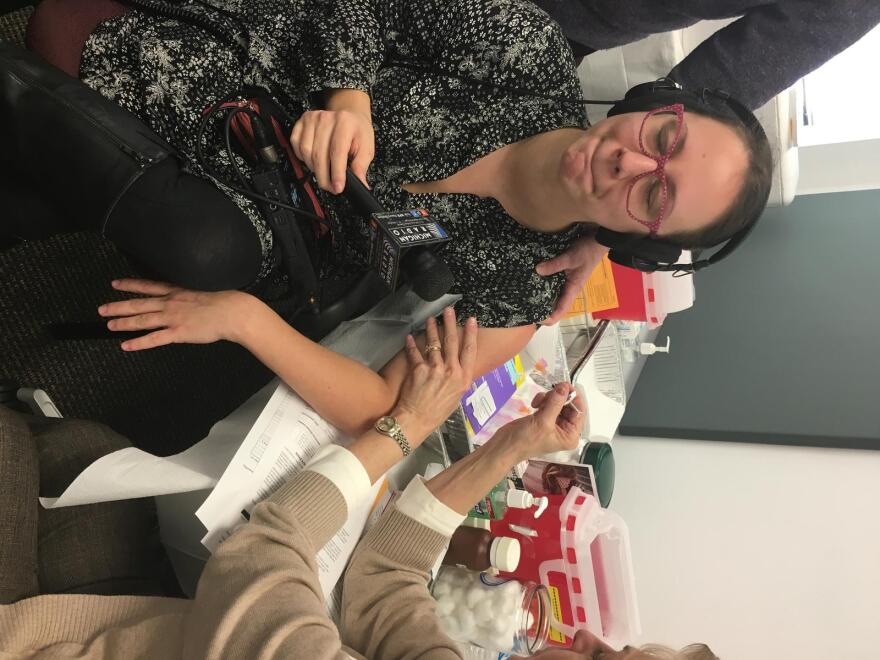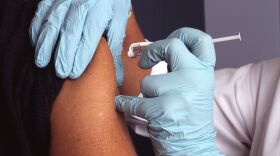All the snow and cold and even a bum wrist from a recent fall didn’t stop Otis Lee from his mission to get vaccinated. Using a cane, Lee hobbled into the student center at the University of Detroit Mercy, where the Detroit Health Department has set up a vaccination clinic specifically for restaurant workers and food handlers.
Southeast Michigan is in the midst of a hepatitis A outbreak. The virus has infected at least 630 Michiganders so far.

Lee heard about the outbreak on the news.
“It concerns me. It doesn’t worry me, but it concerns me,” Lee said, “Anything that happens in the city that gave me all that I have concerns me, and I just want to make people aware that they need to be concerned too and get this shot.”
Because there’s a limited supply of the hepatitis A vaccine, health officials have had to choose who to target. One of those groups is restaurant workers and food handlers.
That’s why Lee is here. His corned beef sandwiches are a legend to many Detroiters. Lee ran Mr. FoFo’s Deli for about three decades. In its heyday, people lined up to get a taste of toasted rye bread, piled high with meat and topped with mustard.
Lee just reopened Mr. FoFo’s after the deli was closed for a few years. No one at Mr. FoFo’s has come down with hepatitis A and Lee wants to keep it that way. That’s why he’s insisting all his employees get the shot.
“I want to assure my customers that they’re dealing with healthy people,” Lee said.
Food handlers at seven Detroit locations have been diagnosed with hepatitis A since October.
We know that, because the Detroit Health Department has put out a public notice about every one of them.
“If there is a potential that someone could’ve exposed mass amounts of people that we don’t have good contact information for those people, that’s where you’ll start to see these kinds of public announcements about specific restaurants,” said Dr. Joneigh Khaldun, who heads the Detroit Health Department.
But it’s not just Detroit restaurants that have been touched by the virus.
Pizza joints in Southfield, Southgate and Grosse Pointe Woods have been affected; a coffee shop in Monroe, a bar in Westland, an Indian restaurant in Ann Arbor, a baker in up in Mt. Pleasant.
Those are just the ones we know about.
Michigan Radio compiled all of the public notices local health departments released about confirmed cases of hepatitis A in food handlers since the outbreak began. Macomb and Ingham County have confirmed cases in food handlers, but decided not to issue a public notice, so specific locations are unavailable in those counties.
Five food handlers working at five different locations in Macomb County have contracted hepatitis A. But the health department there decided not to publicize any of those cases. State law doesn’t require a public notice.
Ingham County has had one that they didn’t publicize either.
“There is no solid rule that says – if a food service worker is sick you must notify the public – and rightly so. We’d be notifying the public like crazy, all the time,” said Ingham County Health Officer Linda Vail.
Vail says they carefully consider the risk of transmission from that infected worker to the public before determining whether a public notice would help protect the public. As an example, Vail says the Ingham County health department did issue a major public notice when norovirus sickened more than 300 people at MSU last year.
But Vail says they don’t want to freak people out if there’s no reason.
“Anytime we release something like that to the press, people then start to get the idea that things are like ‘oh my gosh!’ you know? And you can ruin the business of restaurants by notifying every time you turn around when the situation is really not that dire,” Vail said.
Dr. John Ward is Director of the Division of Viral Hepatitis for the Centers for Disease Control and Prevention. He backs up Vail’s assessment.
“Eating food at a restaurant in Southeast Michigan is very, very low risk for hepatitis A,” Ward said.
"Eating food at a restaurant in Southeast Michigan is very, very low risk for hepatitis A," Ward said.
Less than 5% of cases connected to the outbreak are food workers, according to Michigan’s Department of Health and Human Services. MDHHS couldn’t say how many people have contracted the virus from food handlers.
“While we are aware of events with food handlers and in healthcare settings that have resulted in secondary cases, we don’t have the data broken down in the way that you’ve asked,” MDHHS spokeswoman Angela Minicuci wrote in an emailed response.
Still, restaurant workers in Michigan, especially Southeast Michigan, are a priority for the limited supply of the hepatitis A vaccine simply because of the nature of their work. Poor hand washing and then handling food is an easy way for hepatitis A to get around.
That’s why many local health departments are hosting vaccinations clinics targeting those who work in bars and restaurants, such as people like Brenda Alexander from Rochester, who showed up to a vaccination clinic in Pontiac last month.
“Our manager sent out an email to everybody that said there have been a lot of cases in Oakland County,” Alexander said. “I do work with kids too so I figured better protect myself than get hep A.”

Oakland County’s health officer Leigh-Anne Stafford is thrilled to hear folks like Alexander are getting the message. She says there are a lot of misconceptions about hep A.
“Most people say ‘Oh I have a vaccine against that.’ Or, ‘Oh that doesn’t involve me,' because maybe, ‘Oh that’s just somebody who does IV drug use,” Stafford said.
“But we’re seeing people that do not use IV drugs. They’re not homeless,” Stafford said.
37% of people involved in Michigan’s outbreak say they do not use drugs and they are not homeless.
“If there’s anything we can stress – get vaccinated. At least have a conversation with your physician to determine if you should be vaccinated or if you haven’t been vaccinated,” Stafford suggests.
The only reason health officials aren’t telling everyone to get vaccinated is because there’s a limited supply, according to the CDC. But every health officer and doctor I’ve talked to said they won’t turn anyone away.
So at the vaccination clinic for food workers in Pontiac last month, it wasn’t just waiters, bartenders and cooks getting the shot. There were firefighters and cops, a soup kitchen volunteer, even I got over my fear of needles and got in line.
Want to get vaccinated? Call your doctor or local health department:
The Detroit Health Department offers hepatitis A vaccines at both of its Immunization Clinics Monday, Tuesday, Thursday and Friday, 8am to 5pm and Wednesday 9am to 6pm. The clinics are located at:
The Samaritan Center (5555 Conner Street Detroit, MI 48213)
The Family Place (8726 Woodward Avenue Detroit, MI 48202)
Detroit is also launching a mobile vaccination clinic this month. Restaurants can call the Detroit Health Department at (313) 876-0135 to arrange for vaccinations.
- Wayne County Communicable Disease Unit (734) 727-7078
- Macomb County Health Department (586) 469-5372
- Oakland County Health Division (800) 848-5533 or email noc@oakgov.com
- St. Clair County Health Department (810) 987-5300
- Ingham County Immunization Clinic (517) 887-4316
- Monroe County Health Department Hepatitis A Hotline for updates (734) 240-7878
- Washtenaw County Health Department (734) 544-6700
- Genesee County Health Department (810) 237-4540
- Livingston County Health Department (517) 546-9850







